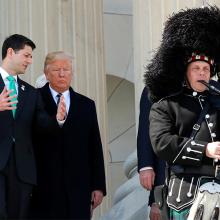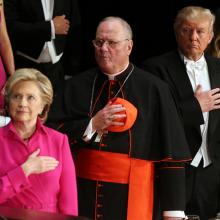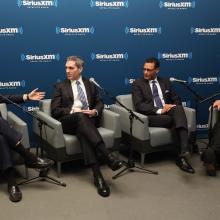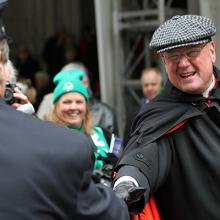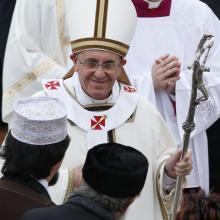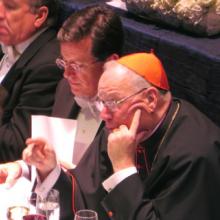cardinal timothy dolan
Religious leaders, including some who spoke at President Trump’s inauguration, are calling on Congress to protect foreign aid that helps the needy across the globe.
Trump’s 2018 budget proposal calls for $25.6 billion in funding for the State Department and the U.S. Agency for International Development. That’s a decrease of $10.1 billion, or 28 percent, from the 2017 budget.
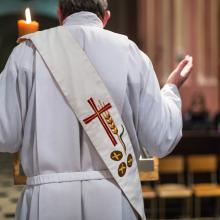
Image via l i g h t p o e t/Shutterstock.com
The Rev. Frank Pavone, a leading anti-abortion crusader and Donald Trump supporter, was jubilant on Nov. 9 after his candidate’s surprising win in the presidential race.
But the head of the Staten Island-based Priests for Life group is also facing a stern rebuke and investigation from his bishop, over Pavone’s shocking election eve video, in which he posed with an aborted fetus on an altar while delivering a 44-minute appeal to voters to elect the Republican nominee.
Behind the scenes, for example, the two candidates – who couldn’t bring themselves to shake hands at the third and final presidential debate a night earlier – were brought together by the cardinal during a brief pre-dinner prayer.
“They were both icy from the beginning, you could tell,” Dolan said. “They’re not on each other’s Christmas card list, I can tell you that. You could tell those two had a rather, I’d say, frigid relationship, more than icy.”

Image via Tatjana Splichal/Shutterstock.com
In a telephone interview, Bornhoft stood by his critique, but said he understood the sense of powerlessness that seemed to motivate many liturgy shamers:
“There are a lot of liturgical issues today and they don’t trust that leadership can do anything. So they see liturgy shaming as an important and effective tool we didn’t have before.”
Indeed, diehard traditionalists — who tend to be the main liturgy-shamers — say the stakes are too high and they don’t feel they have a choice.

Image via Jim Forest / flickr.com
The famous Catholic Worker activist Dorothy Day once remarked, “Don’t call me a saint. I don’t want to be dismissed that easily.” That hasn’t stopped the Archdiocese of New York, however, from moving forward with a “canonical inquiry,” the next step required to become eligible for beatification and then canonization, when a figure officially becomes a saint.

Image via Italianvideophotoagency/Shutterstock.com
At the conclusion of the most recent synod, Pope Francis encouraged bishops assembled to continue their journey. During this ongoing journey, Pope Francis warned against “hostile inflexibility” and to allow one’s self to “be surprised by God.”
Will seeking an understanding into the differences between civil and sacramental marriage help to diffuse church tension? Can religious and civil liberties peacefully coexist?
The words and actions of Pope Francis certainly indicate a desire to explore such a path. The question then becomes: will others follow him on this journey?
Is religion the cause of so much of the violence racking today’s world? Or is faith just one of many factors? Or collateral damage?
Those are tough questions, the kind that are usually posed to religious leaders, not by religious leaders.
But Cardinal Timothy Dolan wanted to switch things up on his weekly radio show, so he invited a minister, a rabbi, and an imam to tackle that issue. What sounds like the opening line of a joke was actually an in-depth discussion of “the rise of religious intolerance.”
“I don’t know if there would be anything more pertinent today, or more timely today, than religious harmony, or the lack thereof,” Dolan, the Roman Catholic archbishop of New York, said March 31 in opening a special edition of his program on the Catholic Channel of the SiriusXM network.
“The elephant in the room is that today, whether we like it or not, religion is often the cause of scandal,” he said.
“Religion is supposed to be an overwhelmingly positive force that brings people together, that increases love and understanding, human progress and human enlightenment.”
But many people today — believers and nonbelievers alike — see religion as the opposite, he said, and “that keeps the four of us up at night.”
St. Patrick’s Day is associated as much with Roman Catholicism as it is with Irish-Americans, but this year some of the faithful aren’t happy with the inclusion of gays and lesbians marching under their own banner for the first time in parades in Boston and New York.
The Knights of Columbus of Massachusetts and a local Catholic school declined to take part in the Boston parade on March 15 after two LGBT groups — the military veterans service group OutVets and Boston Pride — were invited following decades of lobbying and court battles.
“The saint’s venerable name should not be cheaply misappropriated by nominally Catholic politicians and anti-Catholic organizations with a same sex agenda,” said Catholic Action League head C.J. Doyle, a leader of the opposition.
The New York parade marches down Fifth Avenue on March 17, the saint’s feast day, and Cardinal Timothy Dolan is facing renewed calls from conservative Catholics to step down as grand marshal because an openly LGBT group is taking part for the first time.
When it was first announced last September that an organization of LGBT employees at NBC — the network that broadcasts the popular event — would be marching, Dolan voiced support for the parade organizers and prayed “that the parade would continue to be a source of unity for all of us.”
Critics ripped Dolan for his stance, and they ramped up their efforts as the day approached.
“Now there can be no doubt — Timothy Cardinal Dolan has been played for a sucker by the organizers of the 2015 New York City St. Patrick’s Day parade. He must step down as Grand Marshal,” Matthew Hennessey wrote at the website of Crisis magazine, a conservative Catholic media outlet.
“(B)y personally leading the procession, he blesses the whole shameful affair,” he concluded.
To much of the country, Cardinal Timothy Dolan has been the conservative face of the American hierarchy, the happy warrior with a big pulpit who led the American bishops during their toughest battles with the Obama administration over contraception policies and gay rights.
But in his own backyard, the current archbishop of New York is much more of a mediating figure, seen as a community leader as well as a churchman. In recent weeks, he’s increasingly stepped up to help ease the festering racial and political tensions between the police and the people, and even between the police and Mayor Bill de Blasio.
"Historically, the archbishop of New York has been an important civic figure," said Paul Moses, a journalism professor at Brooklyn College and Catholic writer whose latest book is "An Unlikely Union: The Love-Hate Story of New York’s Irish and Italians."
After a decade in which Dolan’s predecessor, Cardinal Edward Egan, focused on church administration and avoided the political spotlight, Dolan’s 2009 appointment was aimed at "restoring that role," Moses said.
In the latest clash between the Catholic hierarchy and one of the church’s leading anti-abortion crusaders, New York Cardinal Timothy Dolan accused the Rev. Frank Pavone of continuing to stonewall on financial reforms, and Dolan said he is cutting ties with his group, Priests for Life.
In a Nov. 20 letter to other U.S. bishops, Dolan said he did not know if the Vatican would now step in to take action against the New York-based priest, who for years has angered various bishops by rejecting oversight of the organization by church authorities and for refusing to sort out his group’s troubled finances.
“My requests of Father Pavone were clear and simple: one, that Priests for Life undergo a forensic audit; two, that a new, independent board be established to provide oversight and accountability,” Dolan wrote in the letter, which was first reported by Catholic World News.
“Although Father Pavone initially assured me of his support, he did not cooperate. Frequent requests that he do so went unheeded. I finally asked him to comply by October 1st. He did not,” Dolan wrote.
Dolan, who had been asked by the Vatican to help Pavone restructure Priests for Life, said in the letter that he has informed Rome that “I am unable to fulfill their mandate, and want nothing further to do with the organization.”
With a controversial Vatican summit on family life just concluded and a papal visit to the U.S. expected in less than a year, the nation’s Catholic bishops on Nov. 10 began taking steps to adapt their agenda to the priorities Pope Francis set out — an emphasis on social justice and on creating a more welcoming church.
That change in focus has unsettled a number of American bishops who have been used to a hierarchy oriented more toward hot-button culture war issues like fighting abortion, gay marriage and the Obama administration’s contraception mandate.
The new shift was underscored by last month’s summit, called a synod, where many churchmen used unusually positive language in referring to gay people and cohabiting couples and others who do not always follow church teachings on family life.
In addition, the announcement Nov. 8 that Francis moved U.S. Cardinal Raymond Burke, a vocal conservative and critic of the pope’s approach, out of his curial post, combined with the pope’s surprise choice of low-profile prelate Blase Cupich as archbishop of Chicago have upended long-standing assumptions about how the church operates.
The bishops “still haven’t fully processed what’s taking place right now,” said Rocco Palmo, who runs a popular Catholic website, Whispers in the Loggia.
The Archdiocese of New York, with the second-largest Catholic population in the country and an unparalleled place in U.S. church history, is shrinking: Cardinal Timothy Dolan on Nov. 2 announced that nearly a third of the archdiocese’s 368 parishes would be merging, and some would close.
“This time of transition in the history of the archdiocese will undoubtedly be difficult for people who live in parishes that will merge,” Dolan said in a statement. “There will be many who are hurt and upset as they experience what will be a change in their spiritual lives, and I will be one of them.”
The reorganization was years in the making and some downsizing appeared inevitable, as happened in the last round of cutbacks, in 2007. While the sprawling archdiocese is still home to 2.8 million Catholics, fewer of them are attending Mass or Catholic schools, and costs are rising. The archdiocese said it is spending $40 million a year to prop up failing or redundant parishes.
Still, the extent of the changes, the largest in the more than 200-year history of the archdiocese, upset many Catholics, especially in neighborhoods where waves of immigration had built and revived parishes across the decades.
“I feel very sad; I was baptized here,” Sonia Cintron, 75, a member of the Church of the Holy Rosary in East Harlem, told The New York Times. “Here we’re family; we loved each other.”
Some parishioners have vowed to try to keep their churches open through petitions and protests.
After two days of fighting between happy liberals and angry conservatives, the Vatican on Oct. 15 dispatched a leading moderate from the U.S. church to tell both sides to temper their expectations about impending changes in church doctrine.
Archbishop Joseph Kurtz of Louisville, Ky., president of the U.S. Conference of Catholic Bishops, stressed that a working document on family issues released on Oct. 13 is simply that — a draft document still subject to amendment by about 200 bishops and lay delegates meeting at Vatican City.
The midpoint report from the two-week Synod on the Family raised expectations that the Catholic Church was poised to revolutionize its teaching on homosexuality, divorce and cohabitation, saying gays and lesbians have “gifts and qualities” to offer the church.
On Oct. 15, Kurtz, flanked by Spanish Cardinal Lluis Martinez Sistach and Italian Archbishop Rino Fisichella, urged both sides to take a breath.
After organizers agreed to allow a gay and lesbian group to march, William Donohue of the Catholic League announced that his organization would not take part in next year’s popular celebration of Irish-American culture, New York’s St. Patrick’s Day parade.
Donohue said the parade organizers had “betrayed” him by promising that an anti-abortion group would be allowed to participate if a gay group were given a permit. But he claimed the committee later reversed itself and said abortion opponents would not be marching next year.
“They not only told me one thing, and did another, they decided to include a gay group that is neither Catholic nor Irish while stiffing pro-life Catholics,” Donohue said in a statement issued Sept. 11. “This is as stunning as it is indefensible.”
The parade organizers had sent mixed signals about whether an anti-abortion group would be marching in the parade.
Cardinal Timothy Dolan’s positive reaction to this week’s decision by organizers of New York’s annual St. Patrick’s Day parade to allow gay groups to march under their own banners initially drew charitable responses in many Catholic Church circles.
But it didn’t take long for conservative church critics to turn.
After initially signaling his grudging acceptance, William Donohue of the Catholic League came back with a revised view when he realized that more than one gay group could be allowed to march in the future.
“The goal of these activists, supported by the corporate elite, is to neuter the religious element of the parade,” Donohue said. “This is an Irish-Catholic parade, and if what comes after the hyphen is cut, so will the parade’s support, beginning with the Catholic League.”
Cardinal Timothy Dolan said Sunday that Pope Francis is asking the Catholic Church to look at the possibility of recognizing civil unions for gay couples, although the archbishop of New York said that he would be “uncomfortable” if the church embraced that position.
Francis said the churches in various countries must account for those reasons when formulating public policy positions. “We must consider different cases and evaluate each particular case,” he said.
The Rev. Frank Pavone, head of Priests for Life and a leading anti-abortion crusader, was braving freezing temperatures with thousands of others at the annual March for Life on Wednesday, but at least he can look forward to a warm embrace from the Catholic Church.
After years of tensions with various bishops, Pavone has complied with demands to straighten out the group’s finances and to become accountable to his home diocese in New York.
The news came in a December letter sent to the nation’s Catholic bishops by Bishop Patrick J. Zurek of Amarillo, Texas, where Priests for Life has been based for several years.
As the U.S. Catholic bishops began their annual fall meeting on Monday, they were directly challenged by Pope Francis’ personal representative to be pastors and not ideologues — the first step of what could be a laborious process of reshaping the hierarchy to meet the pope’s dramatic shift in priorities.
“The Holy Father wants bishops in tune with their people,” Archbishop Carlo Maria Vigano, the Vatican ambassador to the U.S., told the more than 250 American churchmen as he recounted a personal meeting in June with Francis.
The pontiff, he added, “made a special point of saying that he wants ‘pastoral’ bishops, not bishops who profess or follow a particular ideology,” Vigano said. That message was seen as an implicit rebuke to the conservative-tinged activism of the bishops’ conference in recent years.
Almost since his election in March, Francis has signaled that he wants the church to strike a “new balance” by focusing on the poor and on social justice concerns and not overemphasizing opposition to hot-button topics like abortion and contraception and gay marriage — the signature issues of the U.S. bishops lately.
In an unusual move, the Vatican has asked the world’s bishops to quickly canvas the faithful for their views on topics like gay marriage, divorce, and birth control ahead of a major meeting of church leaders set for next fall.
But it’s not clear how or whether the American bishops will undertake such an effort, or if they will only send their own views to Rome.
The letter from the Vatican to New York Cardinal Timothy Dolan, president of the U.S. Conference of Catholic Bishops, was dated Oct. 18 and it asked that a series of questions be shared “immediately as widely as possible to deaneries and parishes so that input from local sources can be received” in time for a February planning meeting in Rome.
The great and the good — and lots of politicians and TV pundits, too — gathered Thursday to hear comedian Stephen Colbert roast and toast everyone from Pope Francis to his host for the evening, Cardinal Timothy Dolan.
The 68th annual Al Smith Dinner, named for the first Catholic presidential candidate in American history, at the Waldorf Astoria hotel raised $3 million for New York’s neediest children.
Colbert is a lifelong Catholic, a man who is, as Alfred E. Smith IV said in introducing him, “serious about both his craft and his Catholic faith.” The cardinal — who is also pretty funny — and the comedian first met last fall, and Colbert had Dolan on his show last month. So the archbishop of New York returned the favor by having Colbert headline the dinner.
